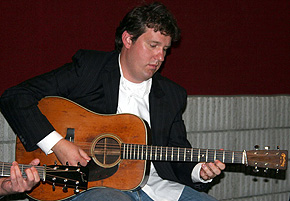April 25, 2009
Supreme Court Strikes Down Sutton Guitar Solo As Pornographic, Obscene

The decision against Sutton cited his solo's "undeniable appeal to man’s basest instincts”, stating that the average listener feels “soiled, depleted, and deeply ashamed at having enjoyed it."
WASHINGTON, DC — The Roberts Court today ruled against former Kentucky Thunder guitarist Bryan Sutton, declaring his extended solo on “Get Up, John” from Merlefest 1998 to be obscene and gratuitous to an extent not protected by constitutional First Amendment free speech provisions.
The 6-3 decision ended a bitter and very prolonged legal battle between Sutton and the United States Justice Department. It also marked an important step in the high court’s efforts to more broadly define pornographic expression, a historically vague and problematic legal issue.
Read more
Bluegrass Hotel Promoter Steals NGR Identity, Holds Self Ransom At Gunpoint
All Proceeds To Benefit American Humane Society

Curtis Burch, a founder of the New Grass Revival, was one of the first bluegrass stars to achieve the celebrity milestone of living full-time in a hotel.
LOUISVILLE, KY — With an astonishing combination of digital age savvy and gangsteresque boldness, Texas event producer Bradford Shifflette has pulled off a plan that radically redefines the entire enterprise of bluegrass concert promotion.
Even his detractors, who have expressed some concern about Shifflette’s “appalling lack of shame” and “very, very low integrity,” are hailing his latest feat as an ingenious and totally original coup de grace.
Shifflette, who claims to be promoting a concert for the fortieth anniversary of the historic Bluegrass Hotel, has staged the supposed abduction of former New Grass Revival guitarist Curtis Burch and is using it as leverage against numerous celebrities.
Read more
Rayna Gellert Executes Twelve-Step Program Backwards in Bid To Recover From Long –Term Sobriety

In an effort to increase her old-time credibility, Rayna Gellert will start at step twelve and work backwards until she has an uncontrollable drinking problem, which she will then deny.
LEXINGTON, KY — Fiddler, singer, and longtime teetotaler Rayna Gellert has about-faced, and she is taking an innovative and methodical approach to becoming a raging alcoholic and old-fashioned moonshine addict.
“My final goal is an uncontrollable problem, immense harm to my loved ones and coworkers, and a total repudiation of God, as I understand Him,” said Gellert.
“And of course, moonshine,” she added.
Gellert, who now enjoys spiritual enlightenment as well as a stable and productive life, announced her plan in response to criticism that her life has diverged too far from the dark folkloric subjects she addresses in her music.
According to critics, the evenness of her personality has become so striking that it now threatens her artistic credibility and limits her potential for mainstream success.
“It’s a long hard road to excessive drinking and misbehavior from where Rayna is starting out,” said Gellert’s sponsor, a musician and fellow Indiana native who goes by the name Uncle Daddy.
“You can do it, baby,” he added.
“The twelve steps provide well-established, clearly defined, attainable goals and logically they do work in reverse,” he continued.
The traditional twelve-step method promotes recovery from various forms of addiction, and the steps are typically executed in order from step one to step twelve.
Gellert, who has simply reversed the process, will begin at step twelve and work backwards.
First, she will experience the exact opposite of a spiritual awakening, suddenly stopping to spread goodwill and assistance to those who need it.Then, she will forever cease all prayer and meditation that might improve her conscious contact with God.
Having totally lost all knowledge of His will and the power to carry that out, Gellert will then make a personal inventory of her future moral shortcomings.
“And that’s only the third step,” said Gellert.
She will then start to make direct damage to other people whenever possible, except when to do so would help them or others in any way.
In the next step, she will make a list of all persons she intends to callously harm, and after getting drunk and inflicting that harm, she will destroy the list.
She will proceed by arrogantly demanding that God Almighty bestow numerous additional shortcomings upon her, regardless of whether she is ready to embrace all these defects of character.
She will then deny to God, herself, and other human beings the exact nature of her wrongs.
In the tenth step, Gellert will make the conscious decision to reclaim her will and life from the care of God, as she understands Him.
She will then come to believe that no power greater than herself can restore her to insanity, and believing this, Gellert will set up a moonshine still and continue drinking heavily.
Finally, she will deny that she is powerless against alcohol and that her life has become unmanageable, and she will enter a brief but exciting period of self-destruction and reduced productivity.
“I know Rayna, and this is not going to be easy for her. But with small enough steps and all of our support, hopefully she can do it,” said J.P. Jones, a mandolin player and supportive fan.
New O’Connor Violin Method for Youngsters Includes Controversial Pledge of Allegiance to O’Connor

Although Mark O’Connor’s American violin method brilliantly integrates folk and jazz to obviate the suffering and oppression of existing all-classical approaches, some parents are suspicious.
NEW YORK — Mark O’Connor, the world-renowned fiddler, composer, and promoter of American musical traditions, has developed a new fiddle methodology that music educators are hailing as the first legitimate American alternative to the popular Suzuki method of violin instruction.
O’Connor’s approach, which is geared toward young players, offers an alluring blend of folk, jazz, country, classical, and even rock and roll instruction without the mandatory ten-year period of suffering and oppression associated with existing all-classical violin methods.
But in some parts of the country, parents have expressed concern about one element of O’Connor’s teaching regimen. Before pupils even pick up a violin, they must memorize a brief Pledge of Allegiance, written by O’Connor, and this pledge is to be recited every morning before fiddle practicing begins. Read more
Old-Time Music Permanently Revokes All Song Titles
Retroactive ruling rids genre of baffling, pointless nomenclature

Old-time music's Council of Elders, responding to pressure from large numbers of irritated jammers, has permanently done away with all song titles forever.
LEXINGTON, KY — In a decision aimed at reducing chaos and promoting the competent execution of old-time music during jam sessions, the industry’s National Council of Elders has unanimously voted to end the long-problematic practice of using words to name old-time fiddle tunes.
From this point forward, musicians will identify fiddle tunes by briefly playing the first four bars, or, in the absence of an instrument, singing some facsimile of that same passage.
The decision to prohibit song titles applies to all existing as well as future tunes, and it is a total repudiation of an age-old system that players have come to regard as a fundamentally flawed failure.
“We’ve been using the old nomenclature for hundreds of years, and it has been an utter disaster,” said Council member and old-time icon Dirk Powell, a very ancient man who has tirelessly promoted old-time music among modern humans.
Old-time fiddle tunes tend to quickly mutate as a result of aural transmission, a highly error-prone process. Within a few short generations a single old-time melody may evolve into many completely different ones in separate parts of the country.
Interestingly, several of the greatest old-time fiddlers ever to live were legally deaf, which often hindered their ability to faithfully reproduce a melody and added to the rapid creation of musical variation.
Unfortunately, most of the variant tunes have retained their progenitors’ original titles, leading to widespread confusion and all-too-common jam session disasters.
“So often in a session, you request a tune by name, say, Chinquapin Hunting, or Blackberry Blossom, or Lost Indian, or Buffalo Gals, or Silver Spear, or Cumberland Gap, or Indian Ate The Woodcock, or Bonaparte’s Retreat, or Backstep Cindy, or Paddy on the Turnpike, or East Virginia, or Five Miles From Town, or Fire on the Mountain, or Polly Put the Kettle On, or Molly Put the Kettle On, or Ducks On the Millpond, or whatever. Everybody says they know it, so you count it off, and each of the nine people in the jam starts playing something completely different,” said musicologist B. Krakauer, a banjo player.
“Train wrecks like those are fatal to group music making, and they certainly aren’t helping our genre’s reputation,” said Foghorn Stringband’s Sammy Lind, who stopped using song titles years before the Council’s ruling.
In addition to the multiple-identity issue that has so badly hampered old-time music, the separate problem of song title loss has proved tremendously vexing.
If, by some miracle, a fiddle tune manages to survive in a recognizable form, more often than not its name is forgotten by the wayside.
“At that point the only function of a tune’s title is to torment you during all your waking hours for not knowing it,” said Powell, on behalf of the Council.
“Yes, my existence is a living hell,” commented fiddler Rayna Gellert.
Indeed, at fiddlers’ conventions many old-time musicians start drinking first thing in the morning, probably to dull these horrible nagging feelings.
“I will miss the titles a little bit, but it’s not like they ever made much sense to anyone,” said Chris Thile, a prominent advocate of the new reference system.
“I mean, what is a Chinquapin, anyway?”
Aoife O’Donovan Found to Be Witch, Burned Alive By Locals During New England Concert
Rises from flames, sings encore on flying broom

The capital felony indictment against Aoife O'Donovan accused her of "enchanting and destroying Christian men in vast multitudes" and "afflicting them with witchcraft." Photo by Thom Conlon.
ESSEX COUNTY, MA — An otherwise lovely Crooked Still concert in New England came to an unexpectedly violent end when a mob of angry local men accused lead vocalist Aoife O’Donovan of witchcraft and proceeded to burn her at the stake following a very brief ad hoc trial.
Pandemonium ensued when Ms. O’Donovan rose from her still-burning pyre and flew through the air on a broom, singing a chilling rendition of “Ain’t No Grave Gonna Hold My Body Down” as what remained of the terrified audience ran for the exits.
The indictment against Ms. O’Donovan charged her with the capital felony crimes of “enchanting and destroying Christian men in vast multitudes,” “afflicting them with witchcraft,” and “willfully, nefariously, and repeatedly casting songlike spells of devastating consequence.” Read more
Botched Exorcism Leaves Soul of Bruce Molsky in 13-Year-Old Girl
“Um, I’m not dead yet, people,” says Molsky
CORVALLIS, OR — A daring attempt to expel the immortal soul of old-time fiddler Bruce Molsky from a young girl’s earthly body has ended in disaster, leaving the girl, Tatiana Hargreaves, 13, possessed by Molsky forevermore.
According to her family, Miss Hargreaves first began to show the extraordinary signs of diabolical possession several years ago, when with no practice whatsoever she acquired an almost superhuman ability to play the old-time fiddle, the long-established instrument of the devil.
Around the same time, she spontaneously and inexplicably became fluent in an entire repertoire of rare, often apocalyptic songs from Appalachia, which she sang in an antique dialect.
Read more






